#Aiōn
Text
*aiw-
also *ayu-, Proto-Indo-European root meaning "vital force, life; long life, eternity."
It forms all or part of: age; aught (n.1) "something; anything;" aye (adv.) "always, ever;" Ayurvedic; coetaneous; coeval; each; eon; eternal; eternity; ever; every; ewigkeit; hygiene; longevity; medieval; nay; never; no; primeval; sempiternal; tarnation; utopia.
It is the hypothetical source of/evidence for its existence is provided by: Sanskrit ayu- "life;" Avestan aiiu "age, life(time);" Greek aiōn "age, vital force; a period of existence, a lifetime, a generation; a long space of time," in plural, "eternity;" Latin aevum "space of time, eternity;" Gothic aiws "age, eternity," Old Norse ævi "lifetime," German ewig "everlasting," Old English a "ever, always."
—Etymonline
51 notes
·
View notes
Text
ancient greek based neopronouns !
[PT: ancient greek based neopronouns ! End PT.]
haîm’/haîma (from αἷμ’ and αἷμᾰ = blood, murder, kin)
gūp/gūps (from γῡ́ψ = vulture)
gê/gês (from γῆ = land, country, soil)
glaú/glaúx (from γλαύξ = owl)
grú/grúx (from γρύξ = dirt under fingernails)
doú/doúx (from δούξ = leader)
drá/dráx (from δρᾰ́ξ = fist, clenched hand, handful (as an unit of mesure), palm)
eí/eíth (from εἴθ’ = if only)
thē/thēr (from θήρ = wild beast)
thō/thōps (from θώψ = flatterer, false friend)
kē/kēr (from κήρ = death, gloom, diety of death)
kê/kêr (from κῆρ = heart)
kû/kûr (from κῦρ = sir, lord)
nú/núx (from νῠ́ξ = night)
nóo/nóos (from νόος = mind, thought, intellect, sense of, meaning of, purpose, perception)
o/oi (from οἴ = woe, grief)
pán/pánth (from πάνθ’ = always)
prō/prōx (from πρώξ = dewdrop)
pû/pûr (from πῦρ = fire, lightning, fever)
sár/sárx (from σάρξ = flesh, body, seat of animalistic desires and thoughts)
sêm’/sêma (from σῆμ’ and σῆμᾰ = sign from the gods, omen, signal, cairn)
stí/stíx (from στίξ = a line of soldiers, a line of poetry)
têl’/têle (from τῆλ’ and τῆλε = far off, far away)
phá/pháps (from φᾰ́ψ = wild pigeon)
phō/phōr (from φώρ = thief)
phō/phōs (from φώς = man, mortal)
phlé/phléps (from φλέψ = vein)
phló/phlóx (from φλόξ = flame, blaze)
phrē/phrēn (from φρήν = midrift, stomach, seat of emotions, heart and hunger, seat of intellect and wits, will, purpose)
phôs/pháos (from φῶς and φάος = light, daylight, light of fire, life of men, day, light of the eyes, window, delight, deliverance, happiness, glory, victory, areola)
khē/khēn (from χήν = goose)
khrō/khrōs (from χρώς = skin, flesh, complexion, color)
hál/háls (from ᾰ̔́λς = salt, brine, sea, wit)
êr/éar (from ἦρ and ἔᾰρ = blood, gore, juice)
ī/īx (from ῑ̓́ξ = worm)
ó/ón (from ὄν = reality)
ókh’/ókha (from ὄχ’ and ὄχα = by far)
óp/óps (from ὄψ = voice, word)
hup’/hupó (from ῠ̔π’ and ῠ̔πό = from underneath, by, through, under, near)
hû/hûs (from ὗς = pig)
rhā/rhāx (from ῥᾱ́ξ = grape, berry)
rhē/rhēn (from ῥήν = sheep, lamb)
ép/épo (from έπω = to speak)
aud/audē (from αὐδή = human voice, speach, sound, report, oracle, song)
aúr/aúra (from αὔρᾱ = breeze, fresh air of the morning, steam)
autó/autós (from αὐτός = self)
ai/aiōn (from αἰών = lifetime, generation, eon, epoch, eternity)
aid/aidōs (from αἰδώς = shame, reverence, modesty, respect, awe)
āe/aēí (from ᾱ̓εί = always, ever, eternally)
aith/aithēr (from αἰθήρ = aether)
ain/ainós (from αἰνός = horrible, dread, dreadful)
aikh/aikhmē (from αἰχμή = point of a spear, head of an arrow, war)
aíg/aíglē (from αἴγλη = light of the sun or moon, radiance of Olympus, glory, splendour)
aíth/aíthō (from αἴθω = to ignite, to burn)
10 notes
·
View notes
Text
#VOICEYOURFAITH
Say these words after me and mean them with your heart 💗 Say, 'I live in health every day because I’ve got the eternal life of God in me. I am not subject to sickness, pain, depression, anxiety, or any form of weakness or infirmity. I will never be sick in my life because Jesus rules and reigns supreme over my life! Sickness does not exist in my aiōn because I am a new creature in Christ Jesus. I have the divine life that flourishes with health, prosperity, success, peace, and joy unspeakable. The Word of God is life to my body and it cleanses my blood and makes me perfect and whole. Glory to God!
3 notes
·
View notes
Text
[Music] Anna Thorvaldsdottir, Iceland Symphony Orchestra, Eva Ollikainen ~ ARCHORA / AIŌN — a closer listen
Over the past decade, Anna Thorvaldsdottir has slowly and steadily become one of the world’s finest composers ~ and she’s done it the hard way, without soundtracks or singles. After patiently expanding her body of work, she’s now released “CATAMORPHOSIS” (on Iceland Symphony Orchestra’s Atmospheriques) and ARCHORA / AIŌN a month apart. Consolidating her oeuvre, Sono […]
Anna Thorvaldsdottir,…
View On WordPress
1 note
·
View note
Text
Aiōn (Joshua) ~Letra español~

Aeon
Sólo una vaga sensación de presentimiento guardada en mi bolsillo
Sin soportar la carga de esas palabras de despedida
Un nuevo día, un nuevo yo que se desvanece
Me quedé sin aliento al intentar procesarlo
Sólo si pudiera correr una vez más
Entre las palabras que fueron como una oración…
No olvides, esos zapatos sucios y cordones desatados enredados
Estaba tan emocionado como un cachorro cuando abrí la puerta de mi habitación
Aunque estén embarrados, son mi tesoro
Está bien, levanta la cabeza
Ahora…
No tengo confianza en mí mismo como para hablar
Mi cara inocente está cansada
Que no se puede vivir sólo de diversión
Frustrados, me tape los oídos
Sin ser capaz de desechar esos zapatos sucios,
Me quedé mirando las suelas desgastadas de los zapatos
Tú no estás aquí, yo no estoy allí
Lágrimas descubiertas
Un amor que nos envuelve a los dos
En el remolino de luz de Aion
No olvides, esos zapatos sucios y cordones desatados enredados
Estaba tan emocionado como un cachorro cuando abrí la puerta de mi habitación
Aunque estén embarrados, son mi tesoro
Está bien, levanta la cabeza
Ahora…
--
(Si ven algún error, no duden en decirme para corregirlo)
3 notes
·
View notes
Text
#DailyDevotion Everything Is Subjected To Jesus' Rule
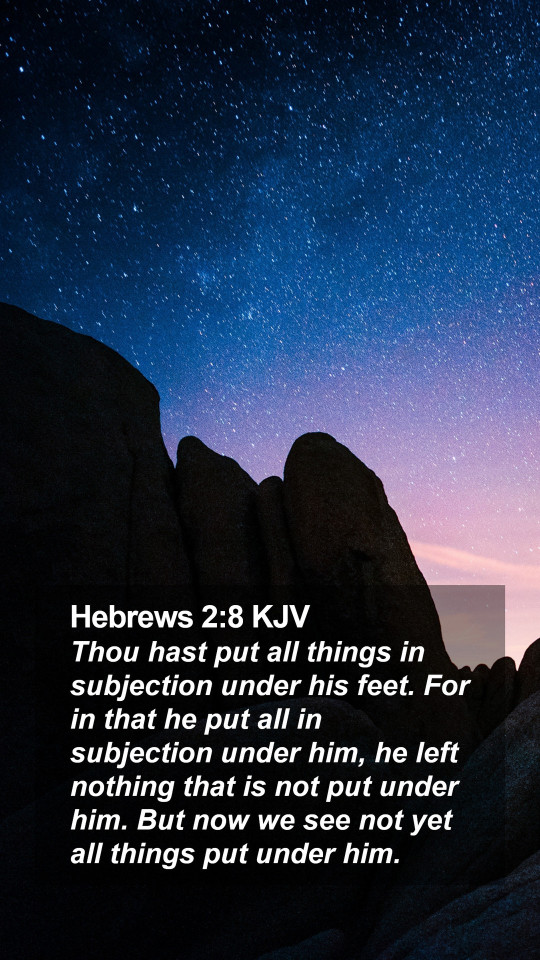
#DailyDevotion Everything Is Subjected To Jesus' Rule
Heb. 2 5He didn't put the coming world that we're talking about under the control of angels. 6But somewhere someone has declared: What is man that you should think of him? Or a son of man that You should come to help him? 7You make Him lower than the angels for a little while then crown Him with glory and honor and make Him Ruler over what Your hands have made 8and put everything under His feet. Now, when He put everything under His feet, He left nothing outside His control.
Jesus is still better than the angels in chapter two. He brings up who the coming world is going to put under subjection. Well it isn't angels. The Greek word for world is oikoumenē from which we get the word economy. It is derived from the word oikeō which is Greek for house. It is where we live. It would be more fun and interesting if Isaiah, Peter and John when referring to the New Heavens and New Earth at the end of the age used this Greek word but they don't. There it is just ge(n) in the Greek. Well maybe it is interesting they don't use that word. The other word I would hope for is aiōn which is Greek for age for the New Testament talks about the age to come. Alas it is mostly translated world but it is occasionally translated kingdom. Now a kingdom is something that is ruled over by someone, and since we are talking about it being subjected to someone, I guess oikoumene is a good word for world here.
He then quotes Psalm 8 concerning man. He seems to be quoting it from the Septuagint (the Greek translation of the Old Testament aka LXX) from memory. Now the Hebrew says He made a little lower than Elohim, which could be God, gods, or divine beings i.e. angels. The Greek translates it angels. Hebrews here also translates it angels. We probably question how are we created a lower than the angels? That's a good question. Perhaps it is because we are mortal. More importantly here, Hebrews is telling us this is first and foremost about Jesus. When He humbles Himself to become man, He is made a little lower than the angels. He has taken our mortality upon Himself. He does this so He may redeem humanity and glorify humanity.
In His glorification as Jesus ascends to the right hand of the Father, He “then crown Him with glory and honor and make Him Ruler over what Your hands have made 8and put everything under His feet. Now, when He put everything under His feet, He left nothing outside His control.” Now this is interesting because when the LORD first created us in Genesis He said, “Let Us make man in Our image, like Ourselves, that they might rule over the fish in the sea, the birds in the air, and the cattle, over all the earth and everything that moves on the earth.” There is a dominion over the world already there. It is thought by many we lost this dominion or at least it was hampered by the Fall. Jesus in our humanity, seated at the right hand of the Father has taken dominion over more than just the animals on the earth. Hebrews says, “when He put everything under His feet, He left nothing outside His control.” That is to say, everything and everyone in all of creation is subject to the Son, Jesus Christ.
When we become one with Jesus through baptism and faith in Him, everything that He has according to His humanity is also ours. We are exalted to the heavenly places (Eph. 2). We are co-heirs with Christ of God and everything that belongs to God. We have become His sons in Christ Jesus.
Heavenly Father, grant us faith in Your Son, Jesus Christ, whom you have exalted over all things that we may inherit the world in Him. In Jesus' name we pray. Amen.
Read the full article
0 notes
Text
ΑΒΡΑΣΑΞ -- ABRASAX From a Hermetic Viewpoint.
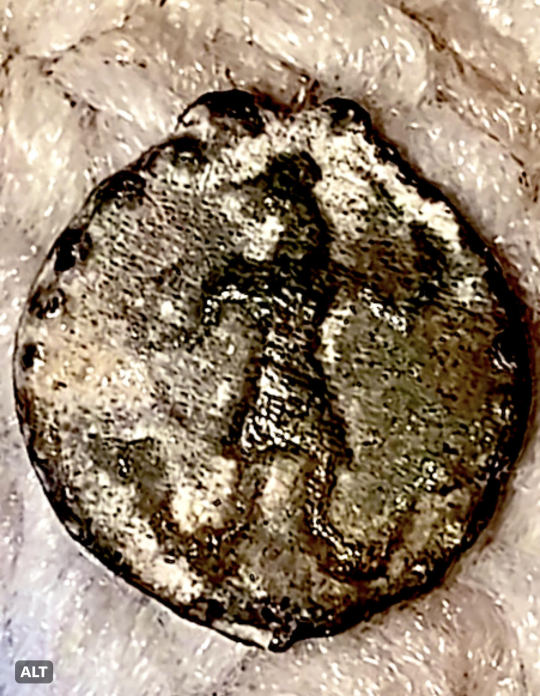
To the Gnostics, Abrasax is the great archon who created the whole world. There is quite a bit of nuance considering how Basilides Gnosticism views this deity. Nuance that I am not qualified to go over at the moment. Carl Jung refers to Abrasax as a truly terrible entity that encompasses all evil and all good, in his Red Book. I've seen negative reactions from people on Discord to this entity, but also some positive reactions.
But to the Hermeticist…who and what is this weird rooster head, snake-legged deity that is found all throughout the Greek Magical Papyri (PGM)? Let’s find out?
In the Discourse of the Ogdoad and Ennead (D89) we are given strings of vowels and nomina Barbara for the Hermetic student, namely Tat as he is being taught by Hermes. To Christian H. Bull in his The Tradition of Hermes Trismégistōs, the string of Greek vowels and nomina Barbara/voces magicae is the totality of the Kosmos. Tat asks to receive the imprint of fullness by ways of hymns of praise to God. Bull seems to agree with Alberto Camplani that the “imprint of Fullness (Pleorma)” is coded within these string of vowels and voces magicae.
From personal experiences — I have to agree with this, but I had to fuck around and find out for myself as I read this book many months ago when vowels and voces magicae were not big in my praxis. Anyways, here is the full hymn:
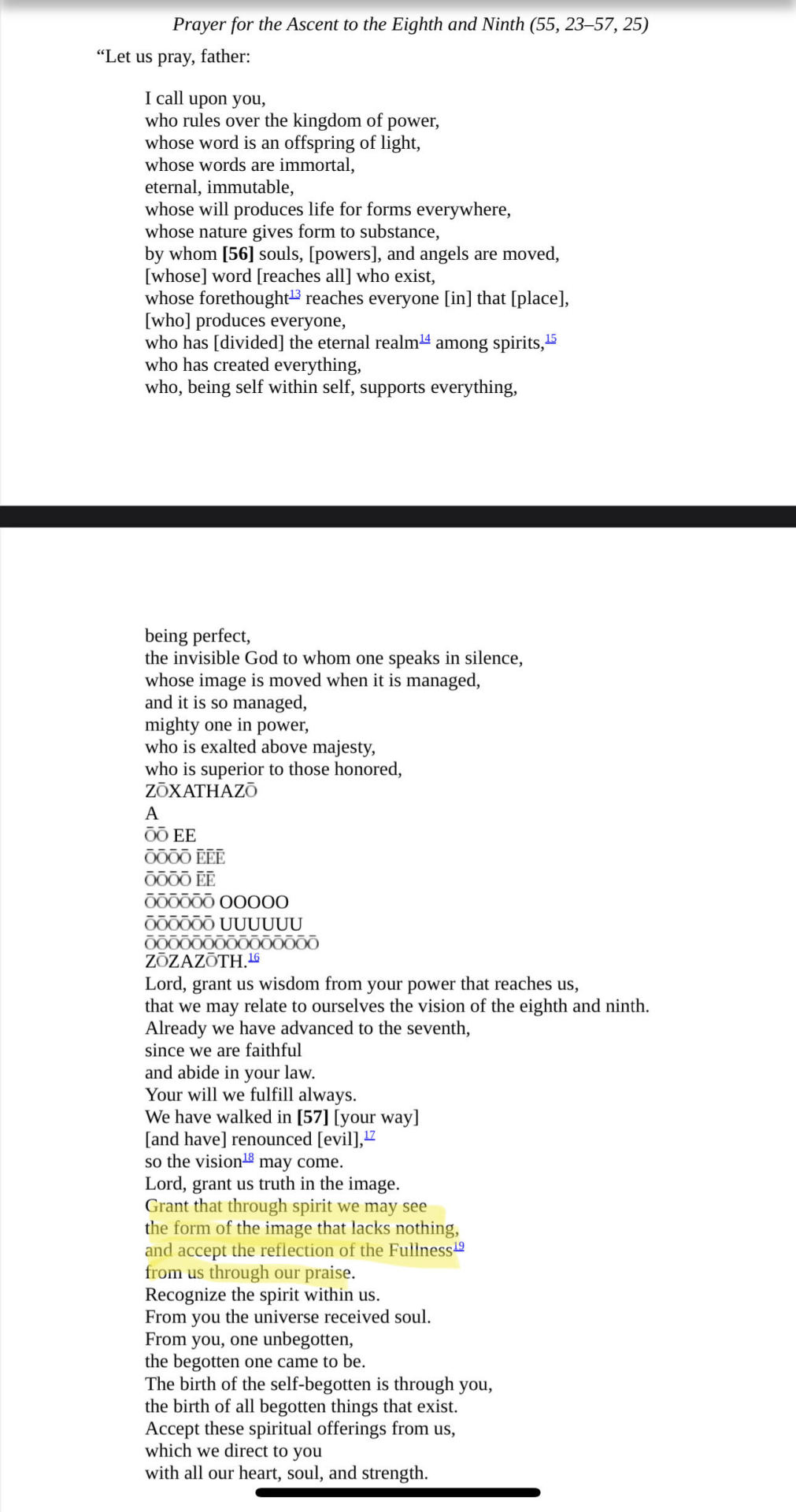
Great! So how does this tie into ΑΒΡΑΣΑΞ and what is this names value to a Hermeticist? For starters — This name, has a numerical value of 365, according to isopsephy. 365, as the majority of you know, is the totality of days our Earth revolves around the Sun. In PGM VIII. 1-63, specifically in lines 45-50… we see a love spell invoking Hermes to which we are given the name of ABRASAX equaling 365 explicitly, and quite possibly a voces magicae for Hermes.
The Sun's importance in Hermeticism is ever-present. Most explicit in my opinion is SH 2a from M. David Litwa’s Hermetica II:
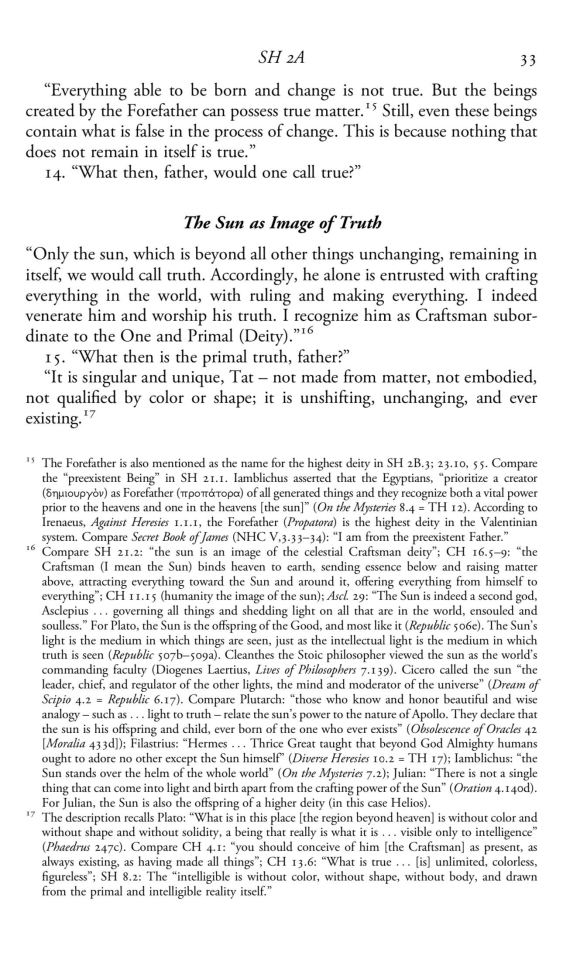
Also important to note: Thoth. Many believe Thoth is just the god of the Moon, yet Thoth has a Solar form: the Baboon. Baboons and their screeches are believed to be connected to the language of the gods. This is confirmed in the Demotic Book of Thoth. Where a scribe of Thoth’s Scribal College: The House of Life [𓉑], says this about the great teacher, Thoth:
"The signs revealed their form. He called to them and they answered to him. He knew the form of speech of the baboons and the ibises."
Thoth is also believed to be the creator of not just words and language but also vowels (Philebus 18b-c). For clarity's sake, Thoth is an extremely important figure in Hermeticism. Our teachings are based upon a syncretic god: Hermes & Thoth — Hermēs Trismégistōs.
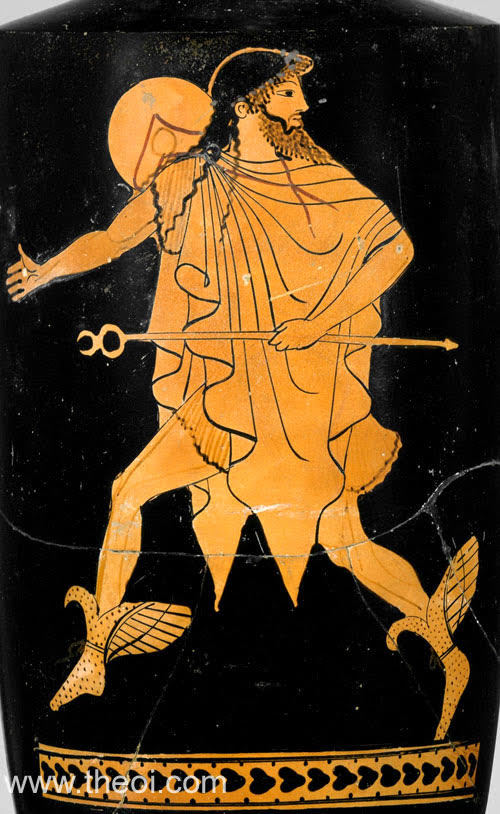
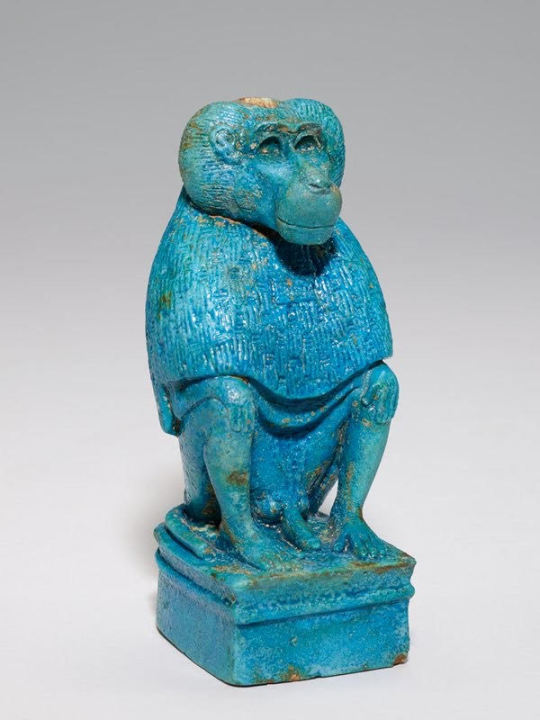
More evidence for the importance of ΑΒΡΑΣΑΞ is found in PGM XIII.1-343 — the famed Heptagram Rite, which we can perform more clearly and neatly here. This is a ritual that invokes Aiōn. Aiōn is believed to be the power of the Unknowable, Ineffable Godhead in Corpus Hermeticum XI. In lines 80-89 of PGM XIII, we are given voces magicae to Aiōn in 7 different languages as seen below.
Birdglyphic: ΑΡΑΙ
Hieroglyphic: ΛΑΙΛΑΜ
Hebraic: ΑΝΟΧ ΒΙΑΘΙΑΡΒΑΘ ΒΕΡΒΙΡ ΕΧΙΛΑΤΟΥΡ ΒΟΥΦΡΟΥΜΤΡΟΜ
Egyptian: ΑΛΔΑΒΑΕΙΜ
Finally, in Baboonic: ΑΒΡΑΣΑΞ
(The voces magicae for Aiōn is continued in 'Falconic' and lastly hieratic languages). Thus, we can see a clear link to baboons and Thoth, the name Abrasax to the baboons, and their "language." We see a connection between Aiōn and Abrasax, and we also saw above in PGM VIII that it could also be used as a voces magicae to Hermes!
But let’s look at the imagery as well. A rooster head with snake legs. The legs, to me, are Chthonic of course, and curl up to shape an Ω, the seventh sphere, Saturn. The connection to Omega is something Christian H. Bill points out. The rooster is also a Solar animal. So to me, we have a beautiful image representing the totality of All Things from the Sun whose an image of Truth, directly subordinate to the One Primal Deity (SH 2a), down to the Du’at/Underworld. Both Hermes and Thoth are connected to the Underworld as well as the Sun. Hermes' planet, Mercury is the closest planet to the Sun. Hermes is also famously known as a psychopomp, a traveler and mediator between Hades and Mount Olympus, Death and Life. Thoth, with His solar connections stated above, is also a key member of the Ancient Egyptian Underworld. In the Ani Papyrus, we see Thoth as the recorder/scribe that lists every heart that is weighed up against the Divine Feather of Truth -- Ma'at.
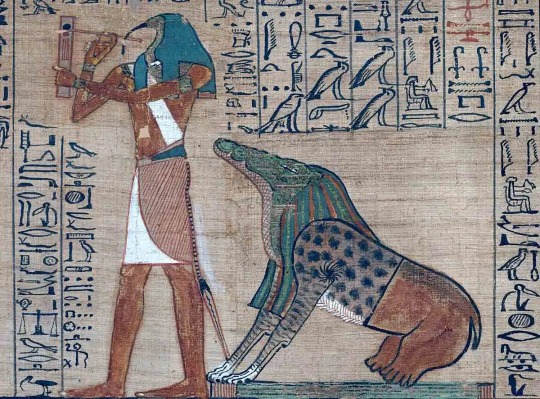
Thus what we have here, from a Hermetic standpoint, is that Abrasax is not a malevolent archon or a demon as denoted by the early Catholic Church, but rather a beautiful deity that is worthy of reverence whose name equals our revolution around the Sun, the Image of God. Abrasax — a name that is connected to both Hermes and Thoth, for reasons stated above. A name that also has a connection to Aiōn, an extremely important power/god in Corpus Hermeticum XI.
That is my interpretation, from a Hermetic standpoint. There are many interpretations of this elusive yet captivating deity. Abrasax can be a voces magicae for Hermes, or for Aiōn, it can be what I said, or you can take the Gnostic approach, or Jung, or Catholic approach to Abrasax. Regardless of what you do with the information, I shall continue to raise my voice in jubilation and cry out:
ΧΑΙΡΕ ΑΒΡΑΣΑΞ !
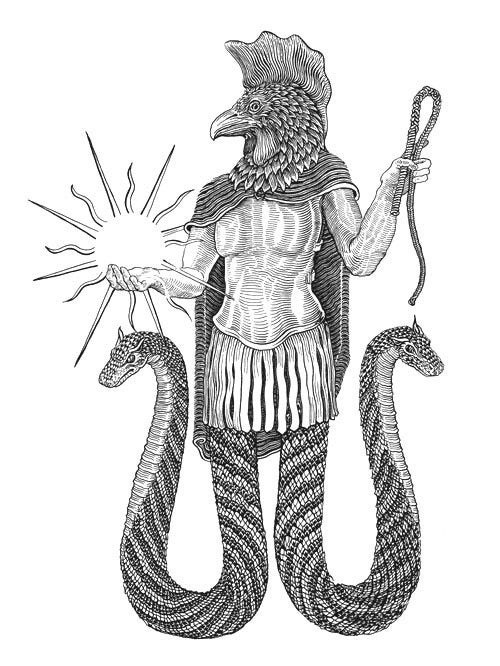
#hermeticism#gnosticism#demon#aion#greek magical papyri#corpus hermeticum#Ogdoad#ennead#nag hammadi library#Abrasax#archon#hermetica#magic#ritual#spells#hermes trismegistus#hermes#thoth#greco egyptian#egyptian#Greek#mythology#underworld#sun
4 notes
·
View notes
Text
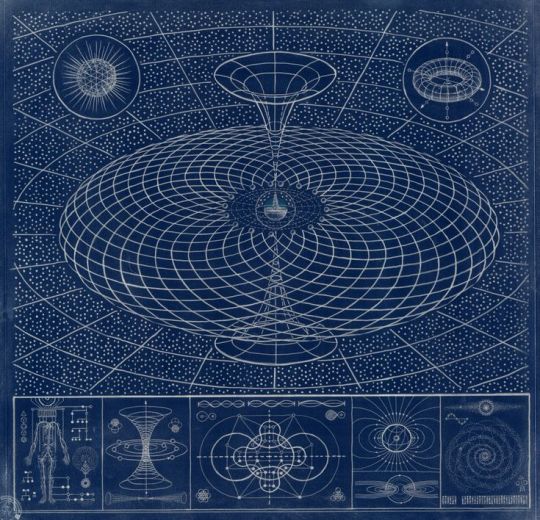
cosmos (n.)
Pythagoras is said to have been the first to apply this word to "the universe," perhaps originally meaning "the starry firmament," but it later was extended to the whole physical world, including the earth. For specific reference to "the world of people," the classical phrase was he oikoumene (ge) "the inhabited (earth)." Septuagint uses both kosmos and oikoumene. Kosmos also was used in Christian religious writing with a sense of "worldly life, this world (as opposed to the afterlife)," but the more frequent word for this was aiōn, literally "lifetime, age." Thus kosmos had an important secondary sense of "ornaments of a woman's dress, decoration" (compare kosmokomes "dressing the hair," and cosmetic) as well as "the universe, the world."
0 notes
Text
etymology — world (n.)
Old English woruld, worold "human existence, the affairs of life," also "a long period of time," also "the human race, mankind, humanity," a word peculiar to Germanic languages (cognates: Old Saxon werold, Old Frisian warld, Dutch wereld, Old Norse verold, Old High German weralt, German Welt), with a literal sense of "age of man," from Proto-Germanic *weraldi-, a compound of *wer "man" (Old English wer, still in werewolf; see virile) + *ald "age" (from PIE root *al- (2) "to grow, nourish").
Originally "life on earth, this world (as opposed to the afterlife)," sense extended to "the known world," then to "the physical world in the broadest sense, the universe" (c. 1200). In Old English gospels, the commonest word for "the physical world," was Middangeard (Old Norse Midgard), literally "the middle enclosure" (see yard (n.1)), which is rooted in Germanic cosmology. Greek kosmos in its ecclesiastical sense of "world of people" sometimes was rendered in Gothic as manaseþs, literally "seed of man."(…) Latin saeculum can mean both "age" and "world," as can Greek aiōn. Meaning "a great quantity or number" is from 1580s. Out of this world "surpassing, marvelous" is from 1928; earlier it meant "dead." World Cup is by 1951; U.S. baseball World Series is by 1893 (originally often World's Series). World power in the geopolitical sense first recorded 1900. World-class is attested from 1950, originally of Olympic athletes.
1 note
·
View note
Photo
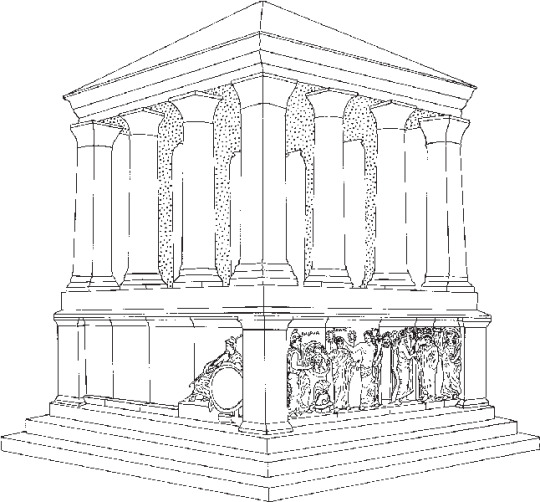
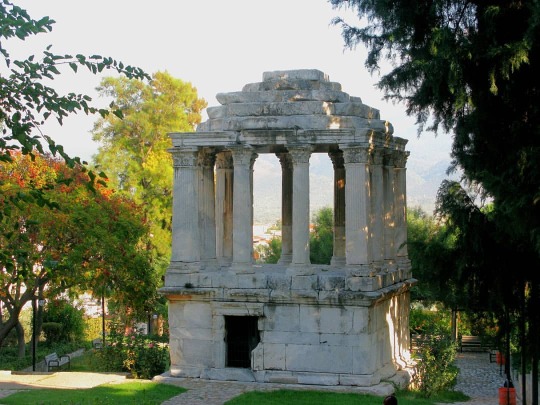
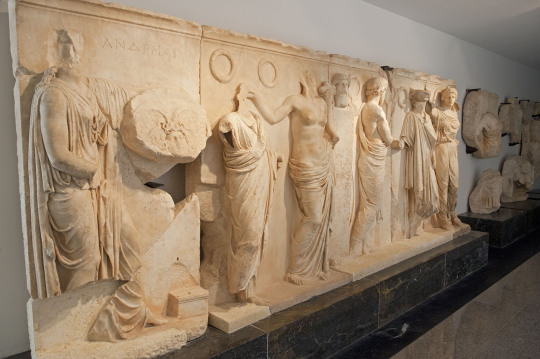
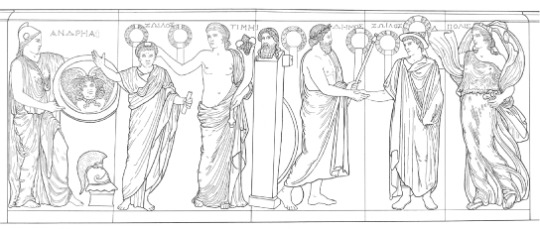
Mausoleum of Zoilos
Aphrodisias, Asia Minor (Turkey)
1st century BCE
The large figured reliefs from a tomb monument to C. Julius Zoilos, a great benefactor of Aphrodisias who lived in the time of Julius Caesar and Augustus, were discovered in 1956 and succeeding years. They were restored once in 1979, and were re-restored and installed in their correct sequence in a new display in the Aphrodisias Museum in 1993-1994. The frieze is the earliest figured marble monument in the city.
C. Julius Zoilos had an extraordinary career. A native of Aphrodisias, he was enslaved and spent much of his life away from the city. Eventually, he was freed and became the freedman and trusted agent of Octavian, later called Augustus, the first emperor of Rome. Zoilos returned to Aphrodisias in c. 40 BCE an extremely wealthy man, and played a prominent role in the life of the city. He was a priest of Aphrodite and paid for at least three major marble buildings: the first phase of the temple of Aphrodite, the elaborate stage building of the theatre, and the north colonnade of the North Agora in the city centre. He was honoured at Aphrodisias with at least two public statues, and died sometime after 28 BCE. He was also honoured with the monumental tomb which the frieze decorated.
Nothing of the tomb building itself has been found, but it can be deduced that the frieze occupied the sides of a square mausoleum. It presents an allegorical account of Zoilos' life and virtues. The main preserved frieze is composed of two groups of three figures, all identified by inscriptions. Zoilos himself is seen in two different costumes in the centre of each group. In the left-hand group Bravery (ANDREIA) presents a shield to Zoilos, who wears a Roman toga, while Honour (TIMĒ) crowns him from the right. The scene celebrates Zoilos' military courage and his status as a Roman citizen. In the right-hand group, the personification of the People (DĒMOS) stretches out his hand to greet Zoilos, who wears a long travelling cloak and cap, while the City (POLIS) crowns him from behind. This scene is an elevated representation of Zoilos' return home from Rome. Subjects represented in other surviving panels included: Eternity (AIŌN), Roma (inscription not preserved), Remembrance (MNĒMĒ), Minos, a judge in the underworld (MEINŌS), Excellence (ARETĒ), and Loyalty (PISTIS).
I used a picture of Gümüşkesen, which is a different tomb, to illustrate the hypothesized reconstruction.
Sources: 1, 2, 3, 4
#art#Architecture#travel#history#Aphrodisias#asia minor#turkey#1 bce#zoilos#monument#grave#tomb#funerary monument#mausoleum#roman#roman art#roman architecture#frieze
125 notes
·
View notes
Text
- - the future isn’t what it used to be
- - the
timeline
has
shifted
I woke up to a start. My body pins and needles as I came out of the daze. Was that a dream? It sounded so clear, I had to have been awake.
The ceiling above me was grey marble. I guess it was considered a luxury in our time. Brick made of purple clay, the color of the majority of our land, made up the walls of the Brovax Manor.
For aiōns, the Brovax family ancestors were the elders of the land. They protected the Rimstone, a pool of water in a cave deep in
15 notes
·
View notes
Text
Etymology of ‘aye’
aye (interj.)
word of assent to a question, 1570s, of unknown origin; perhaps a variant of I, meaning "I assent;" or an alteration of Middle English yai "yes" (see yea); or from aye (adv.) "always, ever."
aye (adv.)
"always, ever," c. 1200, from Old Norse ei "ever" (cognate with Old English a "always, ever"), from Proto-Germanic *aiwi-, extended form of PIE root *aiw- "vital force, life; long life, eternity" (source also of Greek aiōn "age, eternity," Latin aevum "space of time").
(via etymonline.com)
48 notes
·
View notes
Photo

By faith we understand that the universe was created by the word of God so that what is seen was not brought into being from anything observable.
pistis noeō ho aiōn katartizō rhēma theos, eis ho blepō ginomai mē ginomai ek phainō.
- Hebrews 11:3 | Mounce Reverse-Interlinear New Testament (MOUNCE)
The Mounce Reverse-Interlinear™ New Testament (MOUNCE) Copyright © 2011 by William D. Mounce. All rights reserved worldwide.
#faith#understanding#creation#Word of God#observable#unseen#Hebrews 11:3#The Epistle to the Hebrews#New Testament#Mounce#Mounce Reverse-Interlinear New Testament#Holy Bible
3 notes
·
View notes
Text
Sometimes a feeling comes upon you- me- all- some of us, maybe all of us
Maybe all of us, some times or others
That harkens back to the crust and the roots and the growing trees and the tumbling dust
That we call death or growth or decay,
Break down and become anew
Sometimes you can feel the world turning and the twist and burn of dense metals at the core
And the reaching evanescent fur of life on the surface, bursting forth and falling with each passing second, minute, hour, day, week, year, century, eon
Greek: aiōn, meaning ‘age.’
Eons. Ages.
Sometimes if you ride that feeling you can chase the sense of motion
Your time here on Earth
It’s faster than you think.
2 notes
·
View notes
Quote
Do not love the Domination System or the things pertaining to it. If anyone loves that System, the love of the Abba [loving divine parent] is not in that person. For everything in that System - the desire engendered by an alienated body and a wandering eye and the arrogant pretensions of those who are full of themselves - is not of the Abba but is begotten by the Domination System itself. That System is passing away with all its perverse desires, but the person who does what God wants done remains "into the aiōn" that is coming.
1 John 2:15-17
2 notes
·
View notes
Text
The World that God Does not Love
John 15:23–25
Whoever hates me hates my Father also. If I had not done among them the works that no one else did, they would not be guilty of sin, but now they have seen and hated both me and my Father. But the word that is written in their Law must be fulfilled: ‘They hated me without a cause.’
There is a “world” that God does not love. And the Greek word here must be carefully understood. There are different meanings to the Greek word, “cosmos” or “world,” as translated in John 3:16. To the Greek reader and hearer there were several possible meanings to this word. These original hearers would know of these possibilities and would sense the proper intent of the author. But English readers are not always aware of these original intents. In the New Testament, “cosmos” is used some 196 times. Some 73 times it used to refer to the “world system,” or fallen world order. Such a usage in these terms refers to “the people constituting the world whose values, beliefs, and morals are in distinction from and in rebellion to God’s” and to God himself; Thus, a fallen spiritual and governmental system of which Satan is the head. One scholar termed it this way:
“His (the sinner’s) act of ordering his behavior in the sphere of trespasses and sins is dominated or controlled by “the course of this (fallen) world.” “Course” is aiōn (αἰων), which Trench defines as “All that floating mass of thoughts, opinions, maxims, speculations, hopes, impulses, aims, aspirations, at any time current in the world, which it may be impossible to seize and accurately define, but which constitutes a most real and effective power, being the moral, or immoral atmosphere which at every moment of our lives we inhale, again inevitably to exhale,—all this is included in the aiōn (αἰων), which is, as Bengel has expressed it, ‘the subtle informing spirit of the kosmos (κοσμος), or world of men who are living alienated and apart from God’ ” (Trench). The Germans have a word for it, zeitgeist, “the spirit of the age.” “World” is in the head, his demons are his emissaries, and all the unsaved kosmos (κοσμος), which here refers to the system of evil of which Satan are his slaves, together with the purposes, pursuits, pleasures, and places where God is not wanted. To distinguish the words, one could say that kosmos (κοσμος) gives the over-all picture of mankind alienated from God during all history, and aiōn (αἰων) represents any distinct age or period of human history as marked out from another by particular characteristics.”
“But not only does the sinner order his behavior as dominated by the spirit of the age in which he lives, which spirit is just part of that kosmos (κοσμος) human-history-long alienation of the human race from God. He is dominated or controlled by the “prince of the power of the air.”
God does not love the world system of which Satan is the head. There is a “Cosmos Diabolicus” and there is a “redeemed cosmos,” the body of Christ, of which Christ is the head. Here the Greek word, “cosmos” refers to a world order and the governmental hierarchy that compliments and cooperates with its particular head. And such usage is contrasted to the Greek word from which we get our word, “chaos.” Satan’s realm may seem or appear “chaotic” but in the unseen realms, it is very organized and precise. One passage speaks to this spiritual order and its governmental structure:
Ephesians 6:12
For we wrestle not against flesh and blood, but against principalities, against powers, against the rulers of the darkness of this world, against spiritual wickedness in high places.
“The literal Greek is, “Our wrestling is not against blood and flesh.” The Greek reverses the order. The principalities and powers, are the archē (ἀρχη), “first ones, preeminent ones, leaders,” and the exousia (ἐξουσια), “authorities,” the demons of Satan in the lower atmosphere who constitute his kingdom in the air.”
“The rulers of the darkness of this world, the kosmokratōr (κοσμοκρατωρ), “the world-rulers of this darkness,” are Satan and his demons. They are also called “the spirit forces of perniciousness in the heavenly places.”
Hopefully, it should be self-evident that God does not love this world system and John is not speaking of it in John 3:16:
John 3:16
“For God so loved the world, that he gave his only Son, that whoever believes in him should not perish but have eternal life.
The Greek word, “cosmos” can also refer to creation and the diversity and hierarchy found in nature. There are higher and lower forms of life. We give a tacit recognition of this fact when we use terms like “mother nature” and talk of lions, as the “king of the jungle,” etc. The New Testament uses “cosmos” 59 times in this sense. For example:
Romans 1:20
For his invisible attributes, namely, his eternal power and divine nature, have been clearly perceived, ever since the creation of the world, in the things that have been made. So, they are without excuse.
In a similar way, the Greek word, “cosmos” can also refer to just the “third planet from the sun” or the earth as whole. And the New Testament does so some 17 times:
Mark 16:15
And he said to them, “Go into all the world (planet) and proclaim the gospel to the whole creation, (i.e. all of humanity).
And finally, “cosmos” can refer to the people on the planet, that is all of humanity. This was John’s intention in John 3:16: For God so loved all of humanity, that he gave his only begotten son, that whoever among them would believe on a personal and individual basis in the work that Christ did on the cross, would not perish in eternity in hell but would have everlasting and eternal life. How about you? Have you ever truly trusted Christ as your personal savior? Have you taken him for your very own?
Lord Jesus, help any who is coming to you now in simple faith. Show them the value of your work for them. Show them their deep need for your forgiveness and mercy. Show the power of your cleansing blood. Amen!!!
0 notes